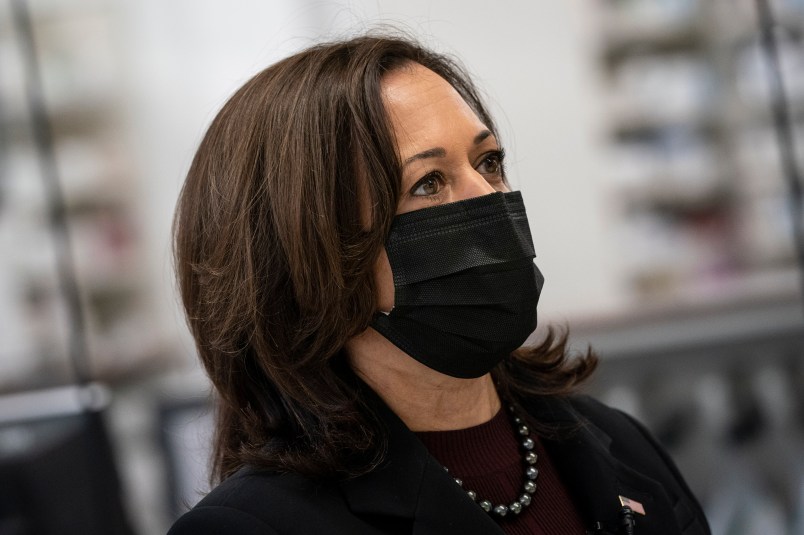In a last-ditch effort, House progressives urged Vice President Kamala Harris (D-CA) Monday morning to overrule the Senate parliamentarian and clear the way for a minimum wage increase to be written into the COVID-19 relief package.
“Eighty-one million people cast their ballots to elect you on a platform that called for a $15 minimum wage,” the 23 House Democrats wrote. “We urge you to keep that promise and call on the Presiding Officer of the Senate to refute the Senate Parliamentarian’s advice on a Byrd Rule point of order and maintain the $15 minimum wage provision in the American Rescue Plan.”
If Harris did overrule the parliamentarian, some House Democrats have argued, it would take 60 votes to stop the bill from going forward with the wage hike in it. Top White House officials have been signaling, though, that they will not overrule the parliamentarian, who nixed adding the minimum wage hike into the relief package last week. The letter allowed House Democrats to remind their voters that the House, for its part, had pushed the minimum wage hard.
It comes after Senate Democrats abandoned their workaround proposal, an attempt to indirectly raise the wage through tax policy. Over the weekend, it proved both substantively and politically difficult to get the proposal banged out on the quick timeline they’re trying to pass the COVID-19 relief package.
“We worked through the weekend and it became clear that finalizing ‘plan B’ with the caucus would delay passage and risk going over the jobless benefits cliff on March 14,” a source familiar with the negotiations told TPM. There is currently no other backup plan for getting the wage hike into the COVID-19 relief bill, the source added.
The news of the workaround being dropped was first reported by the Washington Post.
Senators Ron Wyden (D-OR) and Bernie Sanders (I-VT), who were leading the charge, reportedly gave up as they faced the uphill battle of trying to get the whole Democratic caucus and White House on board with a very quickly-drafted policy.
The workaround entailed punishing “large corporations” that didn’t raise the minimum wage with a 5 percent payroll tax, and rewarding small businesses that did with a tax credit. Many of the specifics were not publicly released.
The proposal was Democrats’ backup idea to circumvent the parliamentarian’s Thursday night ruling. Raising the minimum wage to $15 an hour is a high Democratic priority and enjoys widespread support — except in Congress, where Republicans are largely opposed. Sens. Mitt Romney (R-UT) and Tom Cotton (R-AR) have introduced a measure to increase the wage to $10 an hour, but mandate that businesses use E-Verify to make sure that employees are not undocumented immigrants. Between the paucity of the raise and the expansion of E-Verify absent further immigration reform, it’s likely a nonstarter for Democrats.
The tax workaround raised concerns with experts on and off the Hill, who noted that a lot of people would be left out of the Plan B measure: the proposal only applied to large businesses, which could just opt to pay the tax penalty instead of raising wages. The complex policy also may have been less politically beneficial for Democrats than raising the wage directly.
Democrats tried so hard to get the wage hike into the budget reconciliation process because it stands little chance of passing as a standalone measure, which would need 60 votes to overcome a filibuster.
“There is a much higher probability of success working through the tax code than directly through the Fair Labor Standards Act, as all sorts of tax changes have travelled on reconciliation bills in the past,” a Democratic aide told TPM. “But I have to exercise some humility, as I thought that we won the argument on the direct approach,” the aide said, adding that Republicans will likely combat a wage hike with the same “intensity” no matter the vehicle.
The House passed the COVID-19 relief package early Saturday morning, keeping in the provision that would raise the wage directly. Unless the White House reverses itself on overruling the parliamentarian, the Senate will strip out that section and send it back to the House.
Even if the minimum wage hike is ultimately excluded from the COVID-19 relief package, it won’t be the last we hear about it. If Senate Democrats rally around a standalone bill as the next bite at the apple, it will likely send the simmering filibuster tension to a boil: the current minimum wage fight has become a proxy battle for abolishing the filibuster, as Democrats are using reconciliation for the COVID-19 package in the first place to avoid being filibustered.
This post has been updated.



